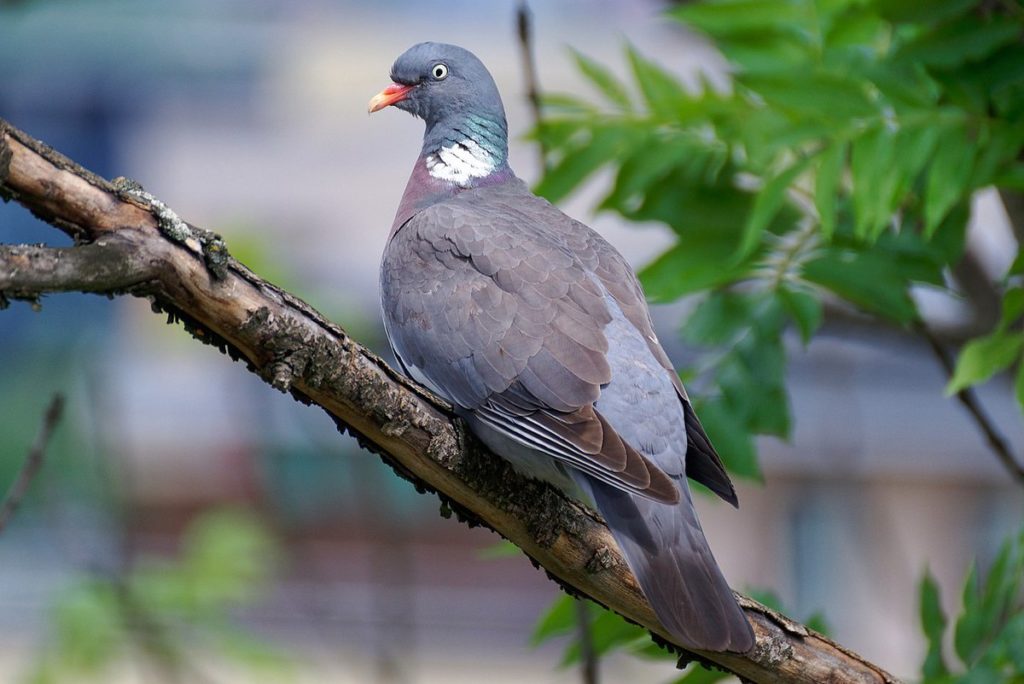No, doves and pigeons cannot crossbreed due to genetic differences. Doves and pigeons, although similar in appearance, belong to different species and therefore cannot breed with each other.
Doves belong to the Columbidae family, while pigeons belong to the Columba genus. This genetic distinction prevents the possibility of crossbreeding between the two. With their distinctive characteristics and behaviors, doves and pigeons continue to exist as separate entities in the avian world.
However, both birds are known for their gentle nature, graceful flight, and cooing sounds, making them popular pets and symbols of peace and love in various cultures. While doves are often associated with weddings and religious ceremonies, pigeons are well-known for their homing abilities and use in pigeon racing.
Understanding The Difference Between Doves And Pigeons
Distinguishing features of doves: Doves, known for their delicate appearance, are typically smaller birds compared to pigeons. They have slender bodies with longer tails and pointed wings. Doves also tend to have softer vocalizations and are often associated with symbols of peace and purity. These birds are commonly found in various habitats, including forests, deserts, and urban areas.
Differentiating characteristics of pigeons: Pigeons, on the other hand, are larger and stockier birds with rounded bodies and broad wings. They have a distinct cooing sound and are often recognized for their ability to navigate and return to their home, known as homing pigeons. Pigeons are commonly found in urban areas, where they gather in large flocks and are known to thrive in diverse environments.

Credit: blogs.zeiss.com
The Breeding Behavior Of Doves And Pigeons
When it comes to the breeding behavior of doves and pigeons, understanding their breeding seasons and patterns is essential. Doves and pigeons generally breed during the spring and summer months when food is abundant and weather conditions are favorable. During this time, their courtship and mating rituals begin.
Male doves and pigeons display elaborate courtship behaviors to attract females. They may perform aerial displays, puff out their chests, and coo loudly to establish their dominance. Once a pair forms, they engage in mating rituals such as mutual preening and billing, which helps strengthen the bond between them.
When it comes to nesting, both doves and pigeons construct simple nests using twigs, leaves, and grass. They often choose concealed locations, such as tree branches or ledges, to protect their eggs from predators. The female usually lays one or two eggs, which both parents take turns incubating. Once the eggs hatch, both parents actively participate in feeding and caring for their offspring.
Potential Crossbreeding Between Doves And Pigeons
Instances of crossbreeding in the wild have been observed between doves and pigeons, leading to a fascination among researchers and bird enthusiasts. While doves and pigeons belong to the same family and share similarities, determining their genetic compatibility for crossbreeding requires careful analysis.
In the wild, instances of hybridization have been witnessed, particularly in areas where different species of doves and pigeons coexist. This suggests that under certain circumstances, these birds can successfully reproduce with each other.
Observations in captivity have also provided insights into the potential for crossbreeding between doves and pigeons. Breeding experiments in controlled environments have shown that hybrids can be produced by mating different species of doves and pigeons. This indicates that genetic compatibility exists between these birds.
While crossbreeding may occur between doves and pigeons, it is essential to consider the long-term implications on the populations and ecosystems involved. Further research is required to fully understand the genetic consequences and potential impacts of such crossbreeding events.
The Genetics Behind Doves And Pigeons Crossbreeding
Doves and pigeons, despite belonging to the same family Columbidae, have some distinct genetic differences. Doves are generally smaller birds with slender bodies and pointed wings, while pigeons tend to be larger and possess more robust bodies. Additionally, their plumage patterns can vary significantly. The genetic similarities between these species are more significant, allowing for the possibility of crossbreeding under certain circumstances.
Crossbreeding between doves and pigeons can produce hybrid offspring with unique characteristics. These hybrids may display a combination of traits from both parent species, including variations in size, color, and markings. However, the precise characteristics depend on the specific genetic makeup of the parent bird and any potential mutations that may arise.
Genetic mutations play a pivotal role in the process of crossbreeding between doves and pigeons. Mutations can introduce variations in the genetic material, leading to differences in physical appearances and even behaviors in the hybrid offspring. These mutations can occur naturally or as a result of selective breeding, further contributing to the diversity of traits seen in crossbred doves and pigeons.
The Impact Of Crossbreeding On Population Dynamics
Crossbreeding between doves and pigeons can have significant effects on population dynamics, including species diversity, potential risks, and benefits, as well as ecological implications. When doves and pigeons crossbreed, the resulting hybrid offspring may possess differing characteristics, which can affect the overall species diversity within a population. These hybrid individuals may display unique traits that can contribute to the genetic variation and adaptability of the population.
However, crossbreeding may also introduce potential risks to the population. Genetic mixing between species can lead to reduced fitness and susceptibility to diseases or other environmental factors. It is crucial to carefully evaluate these potential risks, as they can impact the long-term health and sustainability of the population.
From an ecological perspective, crossbreeding can have implications for resource utilization and competition within the ecosystem. The introgression of genes from one species to another may alter the balance of traits and behaviors, disrupting the natural ecological dynamics.
Debunking Common Myths About Dove-pigeon Crossbreeding
There are several misconceptions surrounding doves and pigeons and their ability to crossbreed. Let’s examine these popular beliefs and their validity:
| Myth | Validity |
| Doves and pigeons cannot crossbreed | False |
| Dove-pigeon hybrids are sterile | False |
| Hybrids have compromised health | False |
| Any dove can breed with any pigeon species | False |
| Hybrids display characteristics of both parents | True |
Contrary to these misconceptions, studies have confirmed that doves and pigeons can indeed crossbreed, producing fertile offspring. These hybrids are not only capable of reproduction but also maintain good health. However, it is important to note that not all dove and pigeon species can successfully interbreed.
Addressing these common myths helps to dispel misunderstandings surrounding dove-pigeon crossbreeding and promotes accurate information in the field.
The Ethical Considerations Of Crossbreeding Doves And Pigeons
Crossbreeding doves and pigeons raises important ethical considerations, particularly in the context of wildlife management and conservation programs. The aim of balance between conserving these species and preserving their natural diversity becomes crucial.
From a conservation standpoint, it is essential to protect and maintain the genetic diversity within populations to ensure their long-term survival. Crossbreeding can potentially disrupt the natural genetic makeup and characteristics of both doves and pigeons. This can have adverse effects on their ability to adapt to environmental changes and to fulfill ecological roles within their respective ecosystems.
On the other hand, some argue that intentional crossbreeding could result in hybrid birds that possess unique adaptations and qualities, which could be advantageous in certain circumstances. However, this must be carefully weighed against the potential risks and uncertainties involved.
Ultimately, wildlife management programs need to consider the potential consequences of crossbreeding and make informed decisions that prioritize both conservation efforts and the preservation of natural diversity.
Frequently Asked Questions For Do Doves And Pigeons Crossbreed
Can Pigeons Cross Breed?
Yes, pigeons can cross breed.
What Is The Relationship Between A Dove And A Pigeon?
A dove and a pigeon are closely related bird species, and the main difference is their size. Doves are generally smaller than pigeons, but they belong to the same family called Columbidae. Both birds have similar characteristics and behavior, often living in urban areas and symbolic of peace and love.
Do Pigeons Doves Mate For Life?
Yes, pigeons and doves do mate for life.
Are Doves Just White Pigeons?
Doves are a type of pigeon that are usually white in color. They are not just white pigeons, but a distinct species within the pigeon family.
Conclusion
While there have been some instances of doves and pigeons crossbreeding, it is not a common occurrence. This phenomenon is more likely when different species of pigeons are involved. Understanding the genetic and behavioral factors that influence crossbreeding can provide valuable insights into avian conservation efforts.
Additional research in this area can contribute to our understanding of the fascinating world of bird breeding and evolution.

Hridoy, a dedicated pigeon enthusiast, is known for his deep affection for these feathered creatures. His passion for pigeons is evident in the way he cares for and cherishes them. From meticulously maintaining pigeon coops to studying their behavior, Hridoy’s love for these birds knows no bounds.
